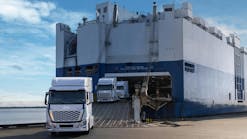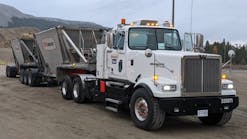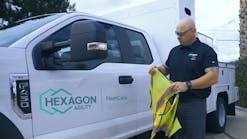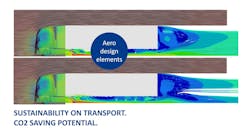Scania recently delivered a 64-tonne (70.5-U.S. ton) electric truck to chemical supplier Wibax, which will operate the vehicle in northern Sweden.
The three-axle electric tractor will help Wibax reach its climate targets, the companies said.
Electrified heavy transport is already happening in Europe, Scania added, and the manufacturer’s newest vehicle runs solely on electricity. The truck has a total weight of 64 tonnes (70.5 tons), including load and trailer, and will run on roads between the cities of Piteå and Skellefteå, a distance of 80 kilometers (49.7 miles) one way.
The vehicle’s performance and load capacity are made possible by the development of a stronger electric motor. As part of a long-term partnership, Scania and Wibax say they’ll work together to optimize the use of the vehicle over time, including charging, battery life, and route planning. This will also provide valuable insights to Wibax as its prepares to add additional electric vehicles to its fleet in the future.
“We have done our utmost to be sustainable since the company was founded in 1986, and as we have identified transports as our biggest environmental impact, this electric truck is a step to ensure we can carry on with our operations with the climate in mind,” said Jonas Wiklund, CEO of Wibax Group. “During the lifetime of this truck, Wibax will reduce CO2 emissions by up to 1,400 tonnes (1,543 tons), making it a true gamechanger.”
Scania and Wibax worked together to enable the electrified solution.
“This is the first fully electric 64-tonner that we put on the road in customer operations,” said Fredrik Allard, head of E-mobility at Scania. “Step by step, we are demonstrating that electric solutions are happening very fast and for basically all segments.”
The continued and rapid development puts further focus on the need for infrastructure and green electricity outside urban areas, too, Scania added. Steps are being taken, but more speed is needed. In this case, the power company Skellefteå Kraft has been involved and is delivering the charging infrastructure.
“It is vital for us to be at the forefront in sustainability matters,” Wiklund said. “It shouldn’t just be something you read on a piece of paper; it should mean something for real. Lighter electrified trucks have been available on the market for a while, but for us, it only really matters now when we are able to electrify our 64-tonne loads. Our values are ‘great chemistry,’ and this investment is in line with that motto.
“These issues have been on the table for long, but now we see that the demand for sustainable solutions from the market increases. This is beginning to happen for real.”









